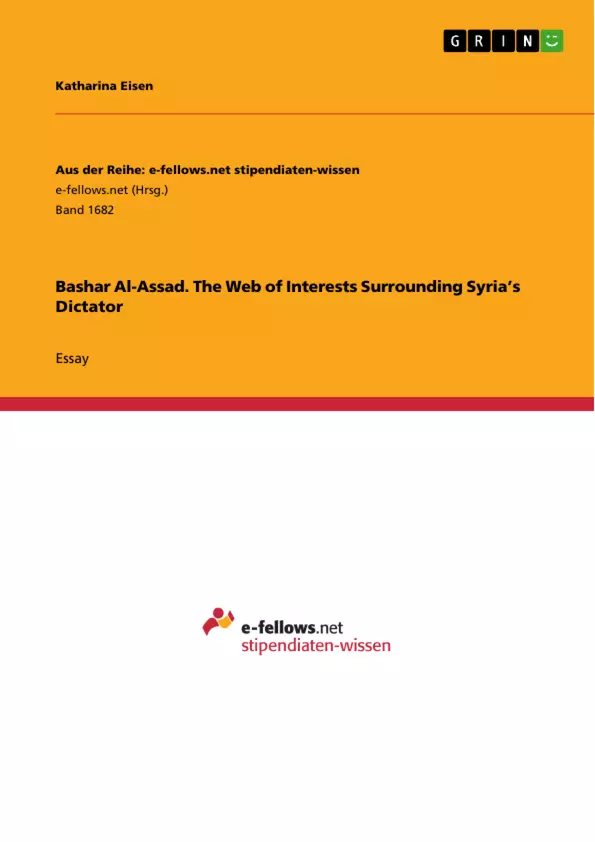The Paris attacks in November 2015 have intensified the urgency of a resolution to the Syria conflict. The Syrian civil war that has been tearing apart the country for more than four years created the power vacuum which the Islamic State filled with its reign of terror. In a conflict as multi-layered as this war, there are, of course, many reasons of why peace negotiations have reaped so little success, but one of them has undeniably become the role of President Bashar al-Assad.
As many of the most recent peace negotiations show, the major obstacle to agreeing on an action plan for political transition in Syria has been the future of Assad in the country’s government. Assad’s role is very controversial as his regime is a close ally for some and the epitome of oppression for others. After briefly examining major stakeholder interests, this report aims to show that the controversy over Assad’s future has become the prime reason for failure of most recent peace negotiations for Syria.
Table of Contents
- Introduction
- Major Stakeholders Outside Syria
- Russia
- Iran
- Turkey
- Saudi Arabia
- USA
- European Union
- Failed Peace Negotiations
Objectives and Key Themes
This report aims to show that the controversy over Assad's future has become the prime reason for failure of most recent peace negotiations for Syria. It examines the major stakeholder interests surrounding Syria, including Russia, Iran, Turkey, Saudi Arabia, the USA and the European Union, and demonstrates how their conflicting views on Assad's role in a post-conflict Syria have hindered any progress towards a peaceful resolution.
- The multifaceted nature of the Syrian conflict and its impact on regional stability
- The divergent interests and positions of major international stakeholders on the future of Syria
- The role of President Bashar al-Assad in the conflict and his influence on peace negotiations
- The challenges to achieving a lasting peace in Syria due to the lack of consensus on a political transition
- The consequences of the Syrian conflict for the region and beyond, including the rise of the Islamic State
Chapter Summaries
- Introduction: This chapter outlines the context and purpose of the report, highlighting the urgency of a resolution to the Syrian conflict and the role of Assad's future in hindering peace negotiations.
- Major Stakeholders Outside Syria: This section explores the interests and perspectives of key international actors involved in the Syrian conflict, including their motivations for supporting or opposing Assad. The chapter analyzes the influence of Russia, Iran, Turkey, Saudi Arabia, the USA and the European Union on the conflict, emphasizing their diverging viewpoints on Assad's role.
- Failed Peace Negotiations: This chapter examines the challenges and failures of past peace negotiations in Syria, highlighting the lack of consensus on Assad's future and the divisions among stakeholders. It analyzes the reasons for the failure of negotiations, including the opposition's refusal to participate in any talks that include Assad and the lack of commitment to a political transition that excludes him.
Keywords
The main keywords of this text are: Syria, Bashar al-Assad, peace negotiations, stakeholders, international relations, Middle East, conflict resolution, political transition, Islamic State, Russia, Iran, Turkey, Saudi Arabia, USA, European Union, refugees, security, terrorism. These terms encapsulate the core themes of the work, highlighting the complex political and security landscape surrounding the Syrian conflict and the challenges to achieving a lasting peace.
Frequently Asked Questions
What is the primary obstacle to peace in Syria according to the report?
The report argues that the controversy surrounding President Bashar al-Assad's future in the Syrian government is the main reason for the failure of recent peace negotiations.
Who are the major international stakeholders in the Syrian conflict?
The key outside actors include Russia, Iran, Turkey, Saudi Arabia, the USA, and the European Union, each with divergent interests and positions regarding Assad.
How did the Syrian civil war impact regional stability?
The conflict created a power vacuum that allowed the Islamic State (ISIS) to rise and fill the void with terror, while also triggering a massive refugee crisis and security concerns across the Middle East and Europe.
Why do Russia and Iran support the Assad regime?
Russia and Iran view the Assad regime as a close strategic ally in the region, providing them with geopolitical influence and military footholds.
What is the stance of the Syrian opposition regarding negotiations?
The opposition has historically refused to participate in talks that include Assad, demanding a political transition that excludes him entirely.
- Arbeit zitieren
- Katharina Eisen (Autor:in), 2015, Bashar Al-Assad. The Web of Interests Surrounding Syria’s Dictator, München, GRIN Verlag, https://www.grin.com/document/313376



